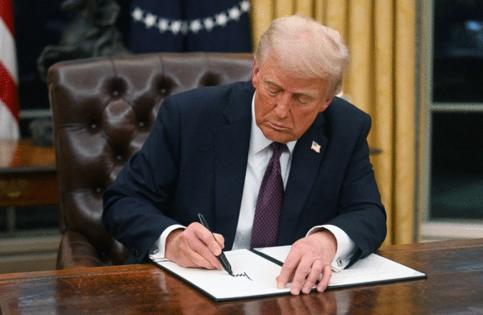Federal court rulings have slowed down Trump deportation plans. What you need to know
Published in News & Features
A flurry of recent federal court rulings have stalled, for the moment, the Trump administration’s efforts to deport as many as one million undocumented migrants this year, as judges increasingly determine that individuals cannot be removed from the country without due process.
Some of the most significant decisions have centered on the administration’s move to suspend benefits provided under Temporary Protected Status and a Biden-era humanitarian parole program, both of which have allowed hundreds of thousands of migrants, primarily from Haiti, Cuba, and Venezuela, to temporarily live and work in the United States.
Also under legal scrutiny is the administration’s invocation of the 1798 Alien Enemies Act, a rarely used wartime law that President Donald Trump has employed to fast-track the deportation of Venezuelans suspected of being affiliated with the feared Tren de Aragua gang.
While the rulings issued in recent weeks are not final, they have effectively limited the administration’s ability to proceed with its aggressive deportation agenda—at least for now.
Here is a look at the key court decisions and what’s next:
TPS for Venezuelans
A federal appeals court in San Francisco has upheld a lower court’s ruling that prevents the Trump administration from revoking Temporary Protected Status for approximately 350,000 Venezuelans residing in various states, many of them in Florida.
The 2023 Temporary Protected Status for Venezuelans was set by the Trump administration to abruptluy end on April 7, but the court’s ruling reinstated the program nationwide for another 18 months until Oct. 2, 2026.
The U.S. Ninth Circuit of Appeals affirmed U.S. District Judge Edward M. Chen’s decision to maintain a block on the Department of Homeland Security’s revocation order. Chen had previously determined that deporting Venezuelan TPS holders without further review could result in “irreparable injury.”
Chen also ruled that DHS Secretary Kristi Noem’s decision to rescind work permits and deportation protections for the Venezuelans was based on “broad generalizations and stereotypes.”
TPS for Haitians and Venezuelans
A federal judge in Boston decided not to hear arguments in a lawsuit aiming to prevent the termination of Temporary Protected Status for Haitian and Venezuelan immigrants. U.S. District Judge Richard Stearns cited a ruling from California the previous day that had already halted the deportation plans, making further action unnecessary for the time being. Stearns also acknowledged the likelihood of a federal government appeal and the potential for the case to reach the Supreme Court, expressing concern that additional litigation could complicate proceedings.
The CHNV program
A federal judge in Boston stopped the Trump administration on April 14 from rescinding deportation protections and work permits for more than a half-million Cubans, Haitians, Nicaraguans and Venezuelans who were granted entrance into the United States under a humanitarian parole program during the Biden presidency. The program, which began in January 2023, allowed migrants who passed background checks and have a sponsor in the U.S. to come to the United States for two years.
As of December 2024, the last month the program — known as CHNV for the initials of the nationalities involved — was in place, more than 500,000 people had used it to come to the U.S.
U.S. District Judge Indira Talwani ruled that the paroled migrants can stay in the United States as they pursue immigration benefits. In effect, her ruling will prevent the Department of Homeland Security’s secretary, Kristi Noem, from revoking their parole status as part of an administration plan to end the humanitarian program on April 24.
No new hearings have been scheduled by the judge yet, but lawyers for the migrants said they expect her to make her final ruling soon as to the legality of the government’s decision to remove the migrants who entered the country under the parole program.
Deportations to El Salvador
The U.S Supreme Court stepped in in the middle of the night Saturday to block the Trump administration from deporting a group of Venezuelan men held in Texas who are accused of gang affiliation. Though the court neither granted nor denied the detainees’ application outright, it effectively put the case on hold, halting deportations from areas of Texas under the Alien Enemies Act.
“The Government is directed not to remove any member of the putative class of detainees from the United States until further order of this Court,” the ruling said.
The move came shortly after an April 7 Supreme Court ruling that reaffirmed the right of individuals facing deportation under the Alien Enemies Act to challenge their removal through habeas corpus petitions to federal judges.
The Supreme Court does not have another hearing scheduled on the usage of the Alien Enemies Act to quickly deport migrant, but has set a hearing for oral arguments for May 15 on an issue that could have profound ramifications on the lives of millions: the administration’s efforts to end automatic birthright citizenship for the children of undocumented migrants.
Courts have recognized since the 14th Amendment was passed in 1868 that, with few exceptions anyone born in the U.S is a natural-born citizen. The administration argues that the amendment doesn’t apply to the children of undocumented migrants.
In the meantime, U.S. District Judge James Boasberg in Washington has ruled that “probable cause exists” to hold Trump administration officials in contempt for violating his orders in March not to use the Alien Enemies Act to swiftly deport Venezuelan migrants to a mega prison El Salvador, or his demand for the return of planes already en route to Central America carrying the deportees.
In his decision, Boasberg gave the administration until Wednesday to either file a declaration explaining steps taken to “purge” the contempt by ensuring deported Venezuelan migrants can challenge their removals, or Identify officials responsible for defying his March 15 order to halt deportation flights under the Alien Enemies Act.
©2025 Miami Herald. Visit at miamiherald.com. Distributed by Tribune Content Agency, LLC.







Comments